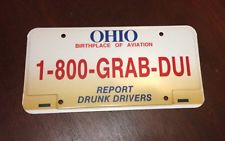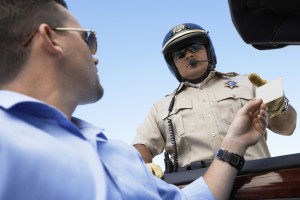 A semi rolled-over and spilled about 11,000 salmon onto the highway. As the fish flopped around on the road, the truck driver was charged with DUI. But it turned-out he had ‘auto-brewery syndrome’, a condition in which his body makes its own alcohol. This condition is rare but has been identified many times. For a person charged with DUI (called ‘OVI’ in Ohio) who drank no alcohol, auto-brewery syndrome may be responsible.
A semi rolled-over and spilled about 11,000 salmon onto the highway. As the fish flopped around on the road, the truck driver was charged with DUI. But it turned-out he had ‘auto-brewery syndrome’, a condition in which his body makes its own alcohol. This condition is rare but has been identified many times. For a person charged with DUI (called ‘OVI’ in Ohio) who drank no alcohol, auto-brewery syndrome may be responsible.
Articles Tagged with Ohio DUI/OVI
Ohio Supreme Court Clarifies Responsibilities For Drivers Involved In Accidents
 Almost everyone will be involved in a car accident at some point in their lives. When a collision occurs, your first concern is probably safety. The last thing going through your mind is what exactly the law requires you to do after the accident. Failing to take the many steps required by Ohio law can result in a charge of leaving the scene of an accident, more commonly referred to as hit-skip. These charges can result in a license suspension, a jail term, driver license points, and a hefty fine. The penalties are so harsh partly because prosecutors and judges assume a hit-skip driver was probably guilty of drunk driving (called OVI in Ohio). So how strictly must the law be followed? The Ohio Supreme Court recently issued a decision which addresses this question.
Almost everyone will be involved in a car accident at some point in their lives. When a collision occurs, your first concern is probably safety. The last thing going through your mind is what exactly the law requires you to do after the accident. Failing to take the many steps required by Ohio law can result in a charge of leaving the scene of an accident, more commonly referred to as hit-skip. These charges can result in a license suspension, a jail term, driver license points, and a hefty fine. The penalties are so harsh partly because prosecutors and judges assume a hit-skip driver was probably guilty of drunk driving (called OVI in Ohio). So how strictly must the law be followed? The Ohio Supreme Court recently issued a decision which addresses this question.
Ohio Supreme Court To Decide Legality Of Stops Based On Anonymous Tips
 If another driver becomes angry with you, that driver can easily call the police and report you as a drunk driver. The driver doesn’t have to give a statement to the police. In fact, the allegation can be completely anonymous.
If another driver becomes angry with you, that driver can easily call the police and report you as a drunk driver. The driver doesn’t have to give a statement to the police. In fact, the allegation can be completely anonymous.
Should police officers be permitted to stop you based only on another person’s anonymous tip? That question will be answered by the Ohio Supreme Court, as it recently agreed to hear the case of State v. Tidwell. The case could have broad implications, not for not just OVI cases, but for individuals’ Fourth Amendment protections in general.
Court’s Decision Regarding Expert Witness Report Affects Ohio DUI / OVI Cases
 In Ohio DUI/OVI cases, the prosecution sometimes introduces expert testimony. If a prosecutor intends to do so, the prosecutor must provide the defense attorney with a written report summarizing the expert’s testimony. According to the Ohio discovery rules, the report must be disclosed to defense counsel at least 21 days prior to trial. What happens when the report does not contain all the expert’s testimony or isn’t provided timely? A recent decision from the Ohio Supreme Court answers that question.
In Ohio DUI/OVI cases, the prosecution sometimes introduces expert testimony. If a prosecutor intends to do so, the prosecutor must provide the defense attorney with a written report summarizing the expert’s testimony. According to the Ohio discovery rules, the report must be disclosed to defense counsel at least 21 days prior to trial. What happens when the report does not contain all the expert’s testimony or isn’t provided timely? A recent decision from the Ohio Supreme Court answers that question.
Can You Be Pulled Over In Ohio For Someone Else’s Crime?
 Imagine for a minute that your car is in the shop. You have some errands to run, so you borrow someone else’s car. A friend, a family member, a coworker, whomever. As you’re driving to the store, you see a police cruiser activate its lights and sirens to pull you over. You weren’t speeding, you didn’t drive over the lane line, you followed every traffic rule in the book. So why are you being pulled over? The officer walks up to your window and says you were stopped because the officer ran the car’s license plate and learned the registered owner of the car had their license revoked. The officer didn’t make any effort to determine whether that registered owner was actually driving the car: he just saw the revocation and pulled you over.
Imagine for a minute that your car is in the shop. You have some errands to run, so you borrow someone else’s car. A friend, a family member, a coworker, whomever. As you’re driving to the store, you see a police cruiser activate its lights and sirens to pull you over. You weren’t speeding, you didn’t drive over the lane line, you followed every traffic rule in the book. So why are you being pulled over? The officer walks up to your window and says you were stopped because the officer ran the car’s license plate and learned the registered owner of the car had their license revoked. The officer didn’t make any effort to determine whether that registered owner was actually driving the car: he just saw the revocation and pulled you over.
Is the officer allowed to do this?
Ohio DUI /OVI Seminar Starts Strong…
 I will always remember OACDL’s 2020 DUI seminar. Near the end of the first day of the three-day event, Ohio’s governor banned gatherings of 100 or more people. Our gathering had more than 100 people. As the president of the organization, I had the responsibility of informing those 100+ people the next two seminar days were cancelled. It was not a popular decision. It’s better to make decisions on principle rather than popularity. The attendees will ultimately receive the remaining two days of continuing legal education, and I expect they will also realize the cancellation decision was correct.
I will always remember OACDL’s 2020 DUI seminar. Near the end of the first day of the three-day event, Ohio’s governor banned gatherings of 100 or more people. Our gathering had more than 100 people. As the president of the organization, I had the responsibility of informing those 100+ people the next two seminar days were cancelled. It was not a popular decision. It’s better to make decisions on principle rather than popularity. The attendees will ultimately receive the remaining two days of continuing legal education, and I expect they will also realize the cancellation decision was correct.
Changing Marijuana Laws Affect DUI/OVI Charges
 As of January 1, 2020, 11 states and Washington D.C. have legalized recreational marijuana use. That number increases to 33 states when you include medical legalization. Several studies have been conducted to determine what effect this ever-growing legal access to marijuana has had on traffic and DUI/OVI statistics. While more data will be needed to ultimately determine the true effect of legalization, these studies indicate there has been an impact.
As of January 1, 2020, 11 states and Washington D.C. have legalized recreational marijuana use. That number increases to 33 states when you include medical legalization. Several studies have been conducted to determine what effect this ever-growing legal access to marijuana has had on traffic and DUI/OVI statistics. While more data will be needed to ultimately determine the true effect of legalization, these studies indicate there has been an impact.
‘Times’ Article Raises Questions About Ignition Interlock Devices
 It makes the roads safer, except when it makes the roads more dangerous. It’s a fair consequence for a person convicted of DUI/OVI, except when it’s unfair. The ignition interlock device has been used increasingly by Ohio and most other states to prevent drunk driving. As illustrated by a recent article in The New York Times, the device intended to encourage safe roads and fair punishment has actually caused accidents and unjust punishments. What should Ohio do?
It makes the roads safer, except when it makes the roads more dangerous. It’s a fair consequence for a person convicted of DUI/OVI, except when it’s unfair. The ignition interlock device has been used increasingly by Ohio and most other states to prevent drunk driving. As illustrated by a recent article in The New York Times, the device intended to encourage safe roads and fair punishment has actually caused accidents and unjust punishments. What should Ohio do?
Motions To Suppress In Ohio DUI / OVI Cases
 In an Ohio appellate case decided this month, the prosecutor assumed defense counsel’s motion was insufficient, and it did not end well for the prosecutor. Defense lawyers often file motions to suppress evidence in Ohio OVI cases. Occasionally, a prosecutor will claim the motion is not particular enough: it’s a ‘shotgun’ motion attacking all the evidence, or it’s a ‘boilerplate’ motion not sufficiently tailored to the defendant’s specific case. The recent case illustrates a prosecutor making that claim should still be prepared to meet their burden of proof.
In an Ohio appellate case decided this month, the prosecutor assumed defense counsel’s motion was insufficient, and it did not end well for the prosecutor. Defense lawyers often file motions to suppress evidence in Ohio OVI cases. Occasionally, a prosecutor will claim the motion is not particular enough: it’s a ‘shotgun’ motion attacking all the evidence, or it’s a ‘boilerplate’ motion not sufficiently tailored to the defendant’s specific case. The recent case illustrates a prosecutor making that claim should still be prepared to meet their burden of proof.
Podcast Interview: “Key Facts About DUI Revealed In Columbus, OH”
 I recently had the pleasure of being interviewed by Grant Eagle on his podcast “5 Minute Legal Insights”. It actually lasted for ten minutes, and I was just getting warmed up! We discussed common misconceptions about DUI/OVI stops, arrests, and court cases. You can listen to the podcast here, and you can also find it on Apple Podcasts, Google Podcasts, Spotify and Stitcher.
I recently had the pleasure of being interviewed by Grant Eagle on his podcast “5 Minute Legal Insights”. It actually lasted for ten minutes, and I was just getting warmed up! We discussed common misconceptions about DUI/OVI stops, arrests, and court cases. You can listen to the podcast here, and you can also find it on Apple Podcasts, Google Podcasts, Spotify and Stitcher.
 Columbus OVI/DUI Attorney Blog
Columbus OVI/DUI Attorney Blog

